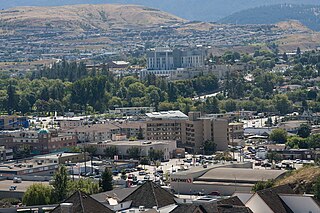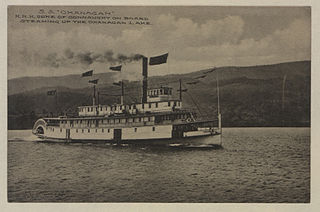
Vernon is a city in the Okanagan region of the Southern Interior of British Columbia, Canada. It is 440 km (270 mi) northeast of Vancouver. Named after Forbes George Vernon, a former MLA of British Columbia who helped establish the Coldstream Ranch in nearby Coldstream, the City of Vernon was incorporated on 30 December 1892. The City of Vernon has a population of 40,000 (2013), while its metropolitan region, Greater Vernon, had a population of 58,584 as of the 2011 Canadian census. With this population, Vernon is the largest city in the North Okanagan Regional District. A resident of Vernon is called a "Vernonite".

The Okanagan, also called the Okanagan Valley and sometimes the Okanagan Country, is a region in the Canadian province of British Columbia defined by the basin of Okanagan Lake and the Canadian portion of the Okanagan River. It is part of the Okanagan Country, extending into the United States as Okanogan County in north-central Washington. According to the 2016 Canadian census, the region's population is 362,258. The largest populated cities are Kelowna, Penticton, Vernon, and West Kelowna.

North Okanagan—Shuswap is a federal electoral district in the province of British Columbia, Canada, that has been represented in the House of Commons of Canada since 1988. The district has been sporadically known as Okanagan—Shuswap.

The Rocky Mountaineer is a Canadian rail-tour company based in Vancouver that operates luxury scenic trains on four rail routes in British Columbia, Alberta, Colorado, and Utah.

Sicamous is a district municipality in the Shuswap Country region of south central British Columbia. The place is adjacent to the narrows, which is the confluence of Mara Lake into Shuswap Lake. At the BC Highway 97A intersection on BC Highway 1, the locality is by road about 73 kilometres (45 mi) west of Revelstoke, 140 kilometres (87 mi) east of Kamloops, and 75 kilometres (47 mi) north of Vernon.

Progressive Rail Inc. is a shortline railroad and owner of several other shortlines. PGR is directly operating several separate branches in Minnesota including the Airlake Terminal Railway. Progressive Rail also acquired the Wisconsin Northern Division in Chippewa Falls, Wisconsin and operates as a separately-named division. They also own the Chicago Junction Railroad, Clackamas Valley Railway, the Iowa Traction Railway and Iowa Southern Railway in Iowa, the Piedmont & Northern Railroad, the Crab Orchard and Egyptian Railroad in Illinois, the St. Paul & Pacific Northwest Railroad, and the Wisconsin Northern Railroad.

The Buffalo Southern Railroad is a class III railroad operating in western New York.

Okanagan Valley Railway was a railroad operating former Canadian Pacific Railway track in the Okanagan region of British Columbia, Canada. Service commenced on November 22, 1998. OKAN's line ran from a CP connection at Sicamous to Vernon. It also had trackage rights on Kelowna Pacific Railway's line from Vernon to Kelowna and from Lumby Junction to Lumby. The railroad was owned by OmniTRAX.
The Okanagan Indian Band is a First Nations government in the Canadian province of British Columbia, located in the city of Vernon in the northern Okanagan Valley. The band is a member government of the Okanagan Nation Alliance.
Monte Creek is an unincorporated community in the Thompson region of south central British Columbia. The former ferry landing is east of the mouth of Monte Creek and on the south shore of the South Thompson River. Immediately west of the BC Highway 97 intersection on BC Highway 1, the locality is by road about 30 kilometres (19 mi) west of Chase and 28 kilometres (17 mi) east of Kamloops.

The Carlton Trail Railway is a shortline railway with its headquarters in Prince Albert, Saskatchewan. It is operated by OmniTRAX, an American transportation company in Denver, Colorado. Carlton Trail has been operating on ex-Canadian National track since December 8, 1997; however, after the acquisition of the branch line CTRW also purchased from CN the Birch Hills-Fenton-Prince Albert branch line in 2001. Since the closure of the pulp mill in 2006, Carlton Trail has typically adhered to a schedule of twice weekly rail service, hauling approximately 2000 carloads per year. According to OmniTrax president Darcy Brede, when the mill reopens in 2014, the railway will begin six days a week service, hauling approximately 3000 carloads a year.
The Kawartha Lakes Railway was a Canadian rail line. It was created in 1996 to assume the operations of the Havelock and Nephton Subdivisions of the Canadian Pacific Railway which serve the Peterborough, Ontario area.

SS Okanagan was a steamship owned and operated by the Canadian Pacific Railway Lake and River Service. The vessel was constructed in 1906 at Okanagan Landing and launched in 1907, becoming Okanagan Lake's second steamship. She linked the transportation hubs at both the north and south ends of Okanagan Lake (Vernon and Penticton, respectively, aiding the development of interior British Columbia with other steamships of the 1900s. The ship was retired in 1934 and sold for scrap and spare parts. Only the Stern Saloon, a room in the back of the upper deck, remains. It was moved to the SS Sicamous Heritage Park in Penticton in 2002, to undergo restoration work.
Lumby Junction is a railway point in Osoyoos Division Yale Land District, British Columbia, Canada, near the north end of Kalamalka Lake, at coordinates 50°14′N119°16′W. Lumby Junction is on the Kelowna Pacific Railway, which operated over railway lines leased from Canadian National Railway Company until Kelowna Pacific entered receivership and ceased operations on June 6, 2013.

SS Aberdeen was a steamship commissioned by Canadian Pacific Railway company. It was the first CPR steamship on Okanagan Lake and carried passengers and cargo from Okanagan Landing to Penticton from 1893 to 1919. Aberdeen connected communities along Okanagan Lake for the first time, creating a new era in the Okanagan Valley and greatly aiding the economy and settlement of the interior of British Columbia.

Canadian National Tug no. 6 was a diesel-powered tugboat owned and operated by the Canadian National Railway (CNR) company on Okanagan Lake, British Columbia. It was launched in 1948 and transferred railway barges between Penticton and Kelowna. It was retired in 1973, becoming the last of many tugboats to operate on Okanagan Lake. Tug 6 was moved to Penticton in 2007 to rest alongside the SS Naramata and SS Sicamous, two Canadian Pacific Railway (CPR) steamboats, as part of the S.S. Sicamous Inland Marine Museum. The ships are currently being restored by the S.S. Sicamous Restoration Society.
MV Pentowna was a motor ship that transported passengers, and later freight, on Okanagan Lake from 1926 to 1973. It was the first boat to be owned and operated by Canadian National Railway (CNR) on Okanagan Lake and the first diesel-powered boat on the lake. Pentowna served the communities between Kelowna and Penticton with two daily round trips, aiding the development of the Okanagan Valley with its modern technology and speed.
Canadian National Tug no. 5, or CN Tug no. 5, was a tugboat owned and operated by the Canadian National Railway (CNR) company on Okanagan Lake in British Columbia, Canada. She was launched on May 8, 1930 and was a steel tug that pushed railway barges to the Okanagan Landing shipyard and railway connection to transport fruit. By the 1950s and 1960s, CNR had three tugs: MV Pentowna, CN Tug no. 6, and CN Tug no. 5. Only one tug operated at a time, though two would be used in busy times, and each tug only pushed one barge. CNR's competitor on the lake, the Canadian Pacific Railway company, ran three tugs at a time, as well as many sternwheelers over the years, and each tug pushed two barges. Although the date of CN Tug no. 5's retirement is unknown, CNR terminated barge service on the lake in 1973, retiring its last ship, CN Tug no. 6, due to the highways and other modes of transportation that had emerged by that time.

Tracy Gray is a Canadian politician who was elected to represent the riding of Kelowna—Lake Country in the House of Commons of Canada in the 2019 and 2021 Canadian federal elections. She served in both the 43rd and 44th Canadian Parliaments as a member of the Conservative Party of Canada. As a Member of Parliament she introduced one bill, Bill C-283 An Act to amend the Criminal Code and the Corrections and Conditional Release Act , which sought to utilize penitentiaries as addiction treatment facilities but it was defeated at second reading. Prior to her election in the House of Commons, she was a city councillor for Kelowna City Council.













